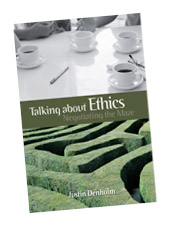“Talking about Ethics: Negotiating the Maze” by Justin Denholm, Brunswick East, Acorn Press, 2011
“Talking about Ethics” lives up to its name in more ways than one:
Firstly, the book itself talks about ethics in ways that are simple and allows the reader to consider the 3 classical ethical positions; 1) Rules and principles 2) Utility 3) Virtue or character ethics. The author gives clear statements to illustrate each ethical position, speaks about a person identified with each of those positions and applies each to euthanasia.
1) Principle based ethical statements include “You can’t do that – it’s not fair!” and “Everyone has the right to a good education.”
Immanuel Kant is an exponent of this position. In applying principle based ethics to euthanasia the author concludes that Kant would argue that euthanasia is immoral. The principle violated here is that we should not use people (not even ourselves) as a means to an end. In the case of euthanasia, we should not use people, killing people, to the end of relieving pain or suffering.
2) Utilitarian ethical statements include “Let’s do what works best for everyone.” In applying this to euthanasia, if living causes more pain than pleasure, suicide or euthanasia would seem to be morally acceptable.
3) Virtue or character ethical statements include “What would Jesus/Gandhi do?” The ancient Greek philosopher Aristotle suggested that suicide is wrong and therefore euthanasia is wrong because people are meant to participate in society and suicide/euthanasia reduces participation (!) and so damages society: moreover it is a cowardly act.
Secondly, “Talking about Ethics” helps us talk about ethics. I was delighted to read statements such as, “The skill of being able to tease out exactly what another person thinks is one of the most fundamental skills of good ethical conversation.” I said some resounding “Amens” to the author’s emphasis on our being curious in seeking to understand, respond and respect people by using clarifying questions.
Throughout the book the author presents good questions for reflection/discussion and also alternative responses to ethical statements. A section on Christian ethical approaches is very helpful in emphasizing the importance of following three aspects of a Biblical approach: values, rules and relationships.
Further ideas to assist us in conversation about ethics include: being aware of the person, the context in which the conversation is being held and seeking to develop “safe” spaces for good conversation. The author also highlights the importance of stories to illustrate our Christian framework.
In 60 pages Justin Denholm presents an easily grasped understanding of ethical frameworks, including a Christian approach and some very helpful ways of entering into and being in conversation about how we live our lives. A good personal read or for use in small groups with the provided discussion questions and study guide.
Read more and buy the book on the Acorn Press website here.
PS I only finished the above a few hours ago and I’ve just read a good example of a newspaper article arguing for moving from Rules/Principle ethics to Virtue/Character based ethics, Ethical behaviour more than just about following rules. It is a good example of an article to which a small group or individual could apply the book’s ideas. Why not have a go? – Oh! You need the book. 🙂


